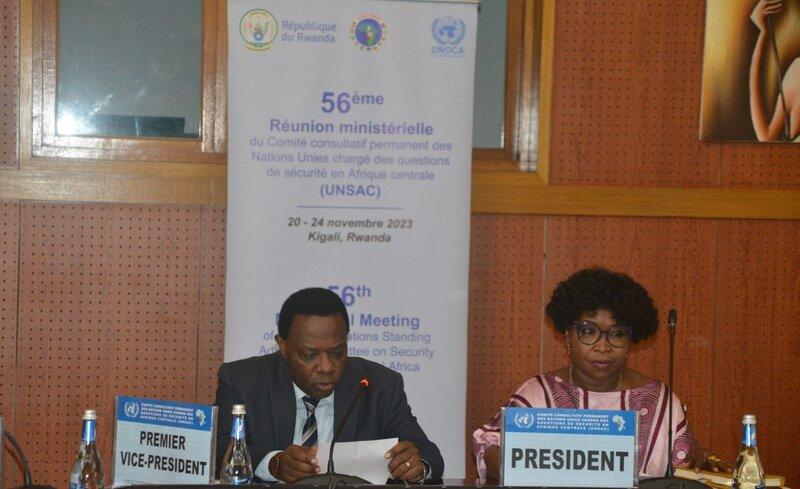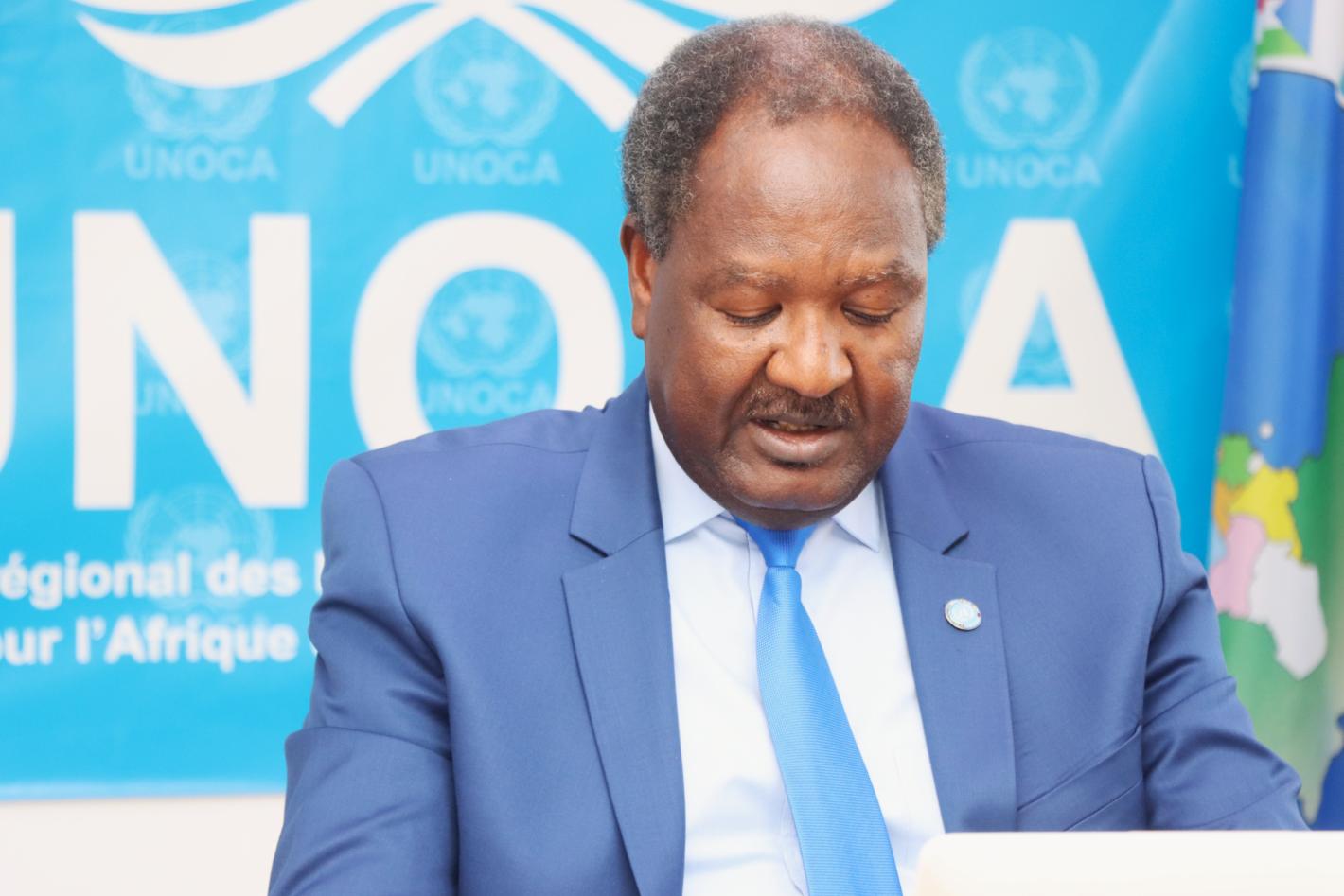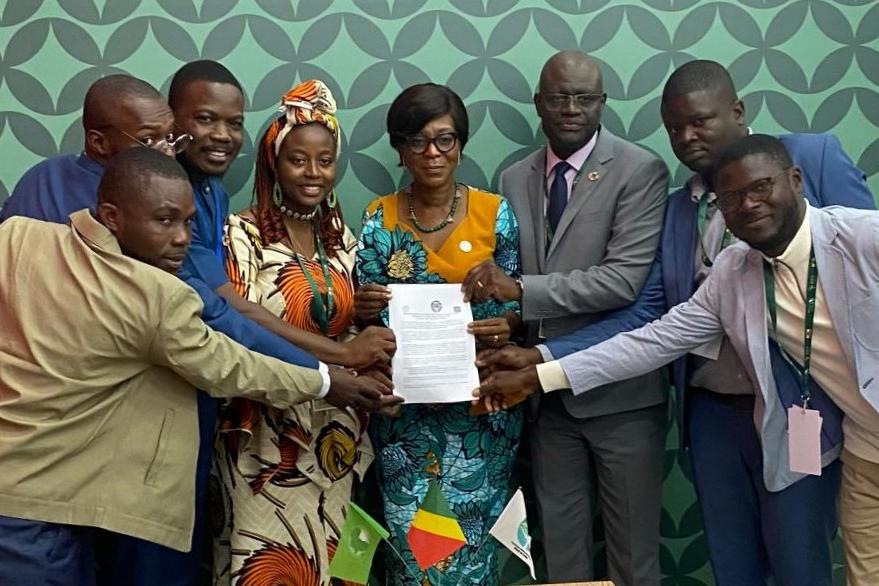The 56th session of the United Nations Permanent Advisory Committee on Security Issues in Central Africa (UNSAC) started in Kigali, the capital of Rwanda, with the meeting of focal points from the 11 Member States namely Angola, Burundi, Cameroon, the Central African Republic (CAR), Chad, Congo, the Democratic Republic of Congo (DRC), Equatorial Guinea, Gabon, Rwanda, and Sao Tome and Principe. In his welcome remarks, Ambassador Guillaume Kavaruganda, Director General for Europe, America and International Organizations at the Rwandan Ministry of Foreign Affairs and International Cooperation, recalled the importance of this session whose main theme is “The prevention of and fight against non-constitutional changes.” He noted that his country was “ready to share its experience and actively contribute to discussions” on this topic. He underlined the importance of prevention, adding that it was an “imperative to guarantee a peaceful and prosperous future [for] citizens.” Ambassador Guillaume Kavaruganda also noted that this theme had “particular significance” in the current African context, and that the search for lasting solutions to challenges that concern everyone required “close collaboration and effective coordination between Nations.”
Rebuilding and strengthening confidence
“Rwanda remains resolutely committed to the principles of UNSAC and the objectives [it] pursues,” said the representative of the host country of the 56th session of this UN body. He also noted the other points on the agenda of this meeting, including the Ministerial segment (on 24 November) that will be preceded by that of experts (from 21 to 23 November). In addition to the review proposed by the ECCAS Commission, which will give an overview of the geopolitical and security situation in the 11 UNSAC member countries, several other topics will be discussed, including those related to climate security, the humanitarian situation, the issue of children in armed conflicts, the state of human rights, etc. In addition, a presentation will be made on ongoing efforts to adopt a regional strategy to address and counter hate speech in Central Africa.

The outgoing Bureau of the Committee will take stock of the implementation of the recommendations and decisions resulting from the 55th UNSAC meeting, which was held from 15 to 19 May, in Sao Tome. It is chaired by the Democratic Republic of Sao Tome and Principe, whose Ambassador to Gabon, Elisa Pereira Afonso de Barros, chaired the meeting of focal points. She expressed the hope that the discussions during the 56th meeting would lead to good prospects for Central Africa in terms of conflict prevention and resolution. She expressed her gratitude to UNOCA for its “unwavering support” as UNSAC Secretariat (since 2011).
In addition to representatives of UNSAC Member States, numerous regional and international organizations with or without observer status participate in the meetings of this body, including UN entities. At least three senior officials from this institution will take part in the meeting in Kigali: Virginia Gamba (Special Representative for Children and Armed Conflict), Huang Xia (Special Envoy for the Great Lakes Region) and Abdou Abarry (Special Representative and Head of UNOCA). The ECCAS Commission team will be led by the Commissioner for Political Affairs, Peace and Security, Mangaral Bante.

NOTE TO EDITORS
■ Established on 28 May 1992 by the UN Secretary-General (in accordance with Resolution 46/37 B adopted on 6 December 1991 by the UN General Assembly), the United Nations Permanent Advisory Committee on Security Issues in Central Africa (UNSAC) is a response to a request made on 28 November 1986 by the member countries of the Economic Community of Central African States (ECCAS). They wanted to have a tool to deal with the numerous conflicts they faced in the 1980s. Today, the Committee remains a framework for consultation on the concerns and threats that jeopardize the stability of the sub-region, its integration and sustainable development. Its main mission is to carry out “activities to rebuild and strengthen confidence between its Member States, in particular through confidence-building and arms limitation measures.” UNOCA has provided the Secretariat since May 2011. This mission was previously the responsibility of the United Nations Regional Center for Peace and Disarmament in Africa (UNREC) based in Lomé, Togo.
■ This is the third time that Rwanda has hosted a UNSAC meeting since UNOCA provided the Secretariat. This country had already hosted the 36th and 45th sessions of the Committee, from 20 to 23 August 2013 and from 4 to 8 December 2017 respectively, in Kigali. The last one resulted in the adoption of two declarations, one on the situation in the Central African Republic (CAR) and the other on the reform of the Central African Peace and Security Council (COPAX). Young people from the Pan-African Youth Network for a Culture of Peace (PAYNCoP) and the National Youth Councils (CNJ) of the ECCAS countries also read a press release published at the end of a workshop organized on the sidelines of the 45th Ministerial meeting. They affirm, among other things, their “willingness to support the promotion of an operational strategy for youth in order to enable their empowerment and contribution to the development and integration of the Central African sub-region, with support from ECCAS, UNOCA, UNESCO and the OIF.” Currently, Rwanda holds the first vice-presidency of UNSAC and will assume the presidency of the Committee after the meeting in Kigali until the 57th session scheduled in six months.




